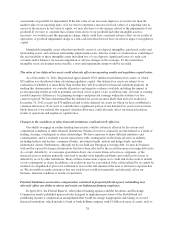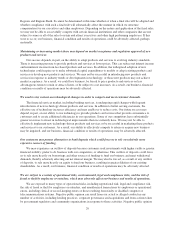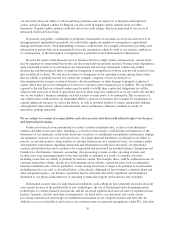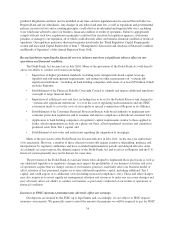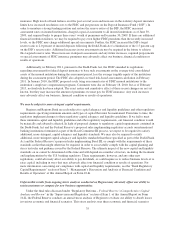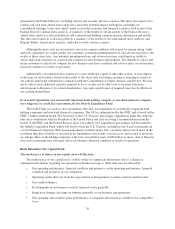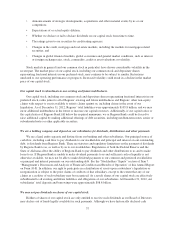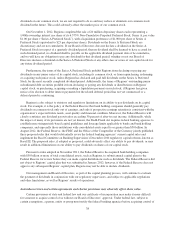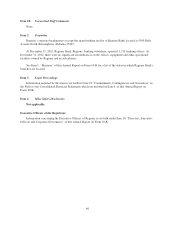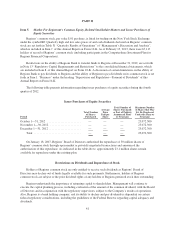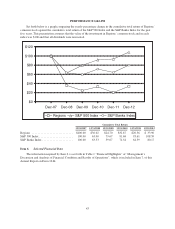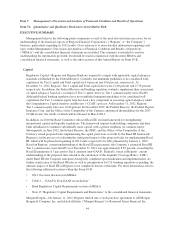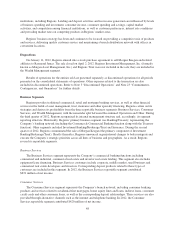Regions Bank 2012 Annual Report Download - page 54
Download and view the complete annual report
Please find page 54 of the 2012 Regions Bank annual report below. You can navigate through the pages in the report by either clicking on the pages listed below, or by using the keyword search tool below to find specific information within the annual report.dividends on our common stock, we are not required to do so and may reduce or eliminate our common stock
dividend in the future. This could adversely affect the market price of our common stock.
On November 1, 2012, Regions completed the sale of 20 million depositary shares each representing a
1/40th ownership interest in a share of its 6.375% Non-Cumulative Perpetual Preferred Stock, Series A, par value
$1.00 per share (“Series A Preferred Stock”), with a liquidation preference of $1,000 per share of Series A
Preferred Stock (equivalent to $25 per depositary share). Dividends on the Series A Preferred Stock are
discretionary and are not cumulative. If our Board of Directors does not declare a dividend on the Series A
Preferred Stock in respect of a quarterly dividend period, then no dividend shall be deemed to have accrued for
such dividend period, no dividend shall be payable on the applicable dividend payment date or be cumulative,
and we will have no obligation to pay any dividend for that dividend period, whether or not our Board of
Directors declares a dividend on the Series A Preferred Stock or any other class or series of our capital stock for
any future dividend period.
Furthermore, the terms of the Series A Preferred Stock prohibit Regions from declaring or paying any
dividends on any junior series of its capital stock, including its common stock, or from repurchasing, redeeming
or acquiring such junior stock, unless Regions has declared and paid full dividends on the Series A Preferred
Stock for the most recently completed dividend period. Additionally, the terms of Regions’ outstanding junior
subordinated debt securities prohibit it from declaring or paying any dividends or distributions on Regions’
capital stock, or purchasing, acquiring or making a liquidation payment on such stock, if Regions has given
notice of its election to defer interest payments but the related deferral period has not yet commenced or a
deferral period is continuing.
Regions is also subject to statutory and regulatory limitations on its ability to pay dividends on its capital
stock. For example, it is the policy of the Federal Reserve that bank holding companies should generally pay
dividends on common stock only out of earnings, and only if prospective earnings retention is consistent with the
organization’s expected future needs, asset quality and financial condition. Moreover, the Federal Reserve will
closely scrutinize any dividend payout ratios exceeding 30 percent of after-tax net income. Additionally, while
the impact of many of its provisions are not yet known, the Dodd-Frank Act requires federal banking agencies to
establish more stringent risk-based capital guidelines and leverage limits applicable to banks and bank holding
companies, and especially those institutions with consolidated assets equal to or greater than $50 billion. In
August 2012, the Federal Reserve, the FDIC and the Office of the Comptroller of the Currency jointly published
three proposed rules that would substantially revise the federal banking agencies’ current capital rules and
implement the Basel Committee on Banking Supervision’s December 2010 regulatory capital reforms, known as
Basel III. The proposed rules, if adopted as proposed, could adversely affect our ability to pay dividends, or may
result in additional limitations on our ability to pay dividends on shares of our capital stock.
Pursuant to rules adopted in November 2011, the Federal Reserve has required bank holding companies
with $50 billion or more of total consolidated assets, such as Regions, to submit annual capital plans to the
Federal Reserve for review before they can make capital distributions such as dividends. The Federal Reserve did
not object to Regions’ capital plan that was submitted in January 2012; however, if the Federal Reserve does not
approve any subsequent Regions’ capital plan, Regions may not be able to declare dividends.
Our management and Board of Directors, as part of the capital planning process, will continue to evaluate
the payment of dividends in conjunction with our regulatory supervisors, and subject to applicable regulations
and other limitations, as well as Regions’ results of operations.
Anti-takeover laws and certain agreements and charter provisions may adversely affect share value.
Certain provisions of state and federal law and our certificate of incorporation may make it more difficult
for someone to acquire control of us without our Board of Directors’ approval. Under federal law, subject to
certain exemptions, a person, entity or group must notify the federal banking agencies before acquiring control of
38


